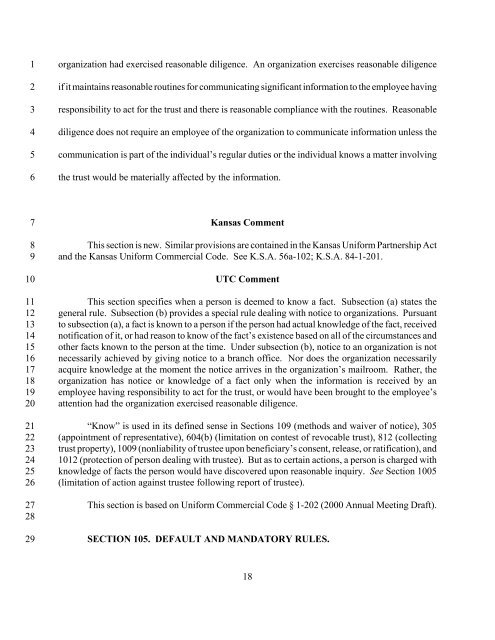uniform trust code - Kansas Judicial Branch
uniform trust code - Kansas Judicial Branch
uniform trust code - Kansas Judicial Branch
Create successful ePaper yourself
Turn your PDF publications into a flip-book with our unique Google optimized e-Paper software.
1<br />
2<br />
3<br />
4<br />
5<br />
6<br />
organization had exercised reasonable diligence. An organization exercises reasonable diligence<br />
if it maintains reasonable routines for communicating significant information to the employee having<br />
responsibility to act for the <strong>trust</strong> and there is reasonable compliance with the routines. Reasonable<br />
diligence does not require an employee of the organization to communicate information unless the<br />
communication is part of the individual’s regular duties or the individual knows a matter involving<br />
the <strong>trust</strong> would be materially affected by the information.<br />
7<br />
8<br />
9<br />
10<br />
11<br />
12<br />
13<br />
14<br />
15<br />
16<br />
17<br />
18<br />
19<br />
20<br />
21<br />
22<br />
23<br />
24<br />
25<br />
26<br />
27<br />
28<br />
29<br />
<strong>Kansas</strong> Comment<br />
This section is new. Similar provisions are contained in the <strong>Kansas</strong> Uniform Partnership Act<br />
and the <strong>Kansas</strong> Uniform Commercial Code. See K.S.A. 56a-102; K.S.A. 84-1-201.<br />
UTC Comment<br />
This section specifies when a person is deemed to know a fact. Subsection (a) states the<br />
general rule. Subsection (b) provides a special rule dealing with notice to organizations. Pursuant<br />
to subsection (a), a fact is known to a person if the person had actual knowledge of the fact, received<br />
notification of it, or had reason to know of the fact’s existence based on all of the circumstances and<br />
other facts known to the person at the time. Under subsection (b), notice to an organization is not<br />
necessarily achieved by giving notice to a branch office. Nor does the organization necessarily<br />
acquire knowledge at the moment the notice arrives in the organization’s mailroom. Rather, the<br />
organization has notice or knowledge of a fact only when the information is received by an<br />
employee having responsibility to act for the <strong>trust</strong>, or would have been brought to the employee’s<br />
attention had the organization exercised reasonable diligence.<br />
“Know” is used in its defined sense in Sections 109 (methods and waiver of notice), 305<br />
(appointment of representative), 604(b) (limitation on contest of revocable <strong>trust</strong>), 812 (collecting<br />
<strong>trust</strong> property), 1009 (nonliability of <strong>trust</strong>ee upon beneficiary’s consent, release, or ratification), and<br />
1012 (protection of person dealing with <strong>trust</strong>ee). But as to certain actions, a person is charged with<br />
knowledge of facts the person would have discovered upon reasonable inquiry. See Section 1005<br />
(limitation of action against <strong>trust</strong>ee following report of <strong>trust</strong>ee).<br />
This section is based on Uniform Commercial Code § 1-202 (2000 Annual Meeting Draft).<br />
SECTION 105. DEFAULT AND MANDATORY RULES.<br />
18

















